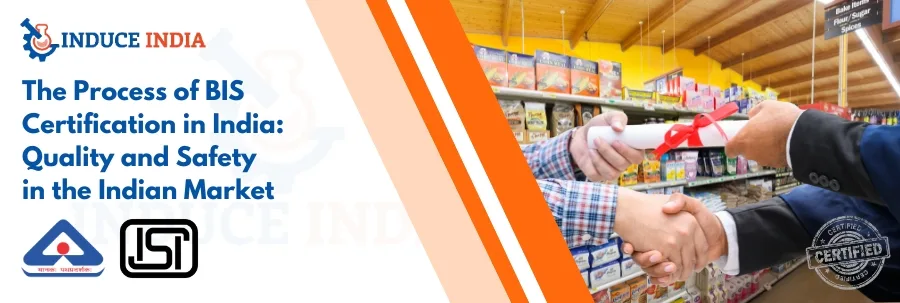Present-day market scenarios are very competitive and extremely fast-changing, and the primary concern is the quality and safety of products. In India, the BIS (Bureau of Indian Standards) has set appropriate standards in the country regarding safety and quality on behalf of Indian consumers and international trade in products. If you are a business desiring to build faith in India, then BIS certification becomes an important step towards achieving that certification. It essentially works to ensure that the product quality standards of India are met by them and allows consumers to trust the product in question. This article discusses all the processes involved in exercising BIS certification in India and its significance to businesses and consumers alike.
What is BIS certification?
In India, the governmental institution of the Bureau of Indian Standards (BIS) is responsible for the issuance of standards intended for the certification of both products and services. Under the BIS Act of 1986, it came into being and is currently referred to as the Indian National Standards Body (INSB). Any product bearing an ISI certification mark from a certifying body recognized under BIS is understood to be operated according to Indian standards concerning safety, quality, and reliability. The range of products includes food and beverages, electronic appliances and devices, and construction.
The test mark of BIS is also commonly called the ISI mark. It gives confidence to the consumer of India that the product under concern conforms to prescribed quality and safety standards as specified by BIS.
BIS Certification Importance
- Consumer Safety: The purpose of certification is to ensure that the products are safe for the consumers to use. This could be electrical appliances, food, or even construction materials. The certification thus shields consumer health and safety.
- Quality Assurance: It means that a BIS-certified product holds admission to standards established with extreme rigor. So the company can assure customers that they are buying reliable products with durability.
- Market Access: Whenever products are to be exported to India, BIS certification is often a mandatory requirement. It thus paved the way for international trade and the establishment of credibility in the Indian market.
- Regulatory Compliance: BIS certification shall guarantee that the business complies with Indian regulations, hence causing a reduction in legal issues or penalties.
- Competitive Advantage: Products bearing the BIS mark flaunt status against their non-certificated peers. It ensures that customers are making their choices based on high-standard products, thus leading to increased sales and consumer loyalty.
The Process of Obtaining BIS Certification
The process for obtaining BIS certification in India involves several important steps. Here is an insight into the project:
- Application Submission
First, the applicant must apply for BIS certification with the Bureau of Indian Standards. The application form can be downloaded from the official BIS website. The applicant should give full particulars regarding the product, the process of manufacture, and quality control measures employed.
- Document Submission
The manufacturer has to submit several documents in addition to the application form, such as; Proof for ownership or lease of the building used for manufacturing.
Details on specifications of the product.
- Test reports from an accredited laboratory (if applicable).
- Details of the raw materials used in the manufacture.
- Extent of quality control procedures and policies in the manufacturing unit.
- Factory Inspection
Post-submission of application and documents, an inspection of the factory by BIS will be carried out to ascertain manufacturing processes, quality control procedures, and other overall compliances according to standards. BIS inspectors audit if the product is being manufactured as per the approved specifications.
- Product Testing
In most instances, BIS would require product samples to be tested at a laboratory accredited by it. This is to ascertain that the product meets specific quality and safety requirements. Testing will be based on the relevant Indian Standard (IS) specific to the product.
- Compliance Evaluation
On completion of factory inspection and product testing, BIS establishes conformity of the product and manufacturing process in conformity with relevant standards. If the product passes all assessments, BIS approves the certification.
- BIS Certificate Issuance
If the product is found to comply with all standards, the BIS will issue the BIS certificate, and the product will be entitled to the ISI mark. This certification usually remains in force for 2-3 years, after which the company will have to renew it.
- Surveillance and Monitoring
Sustainably monitoring quality, following issuance of the certificate, occurs via the process of regular inspections and tests for the product under the BIS. This ensures businesses maintain the required high standards to keep meeting specifications.
Types of BIS Certification
Regarding products and industry, BIS certifications are of various kinds. Some of the frequent ones are:
- Certification of ISI Mark: ISI is the most popular and high-trust registration symbol for quality, as it is widely accepted among all categories, from electrical to food items.
- Hallmarking: This is a certification that ensures the metal is pure. This applies only to precious metals like gold and silver.
- Compulsory Registration Scheme: Under the compulsory registration scheme in India, certain things like electronics and electrical appliances have to be registered before they can be sold in India. This is done in relation to the safety aspects of the products.
- BIS Certification for Export: Consumers gain BIS certification because they can export their goods easily to India after they’re certified.
Key Industries Benefiting from BIS Certification
BIS certification has gainfully entered into a litany of industries. Some of the key sectors include:
- Electronics and Electrical Goods: Mobile phones, refrigerators and air conditioners are some examples of products that must acquire BIS certification requirements of safety from Indian standards.
- Food and Beverages: Consumers are assured that their food products meet health and safety regulations because of BIS certification. This adds to the maker’s credibility in the cutthroat competitive food market.
- Construction and Building Materials: All quality building materials, BIS-certified, ensure that buildings are strong and safe and are thereby compulsory for construction companies.
- Automobiles and Auto Parts: This certification states the safety and quality standards expected from auto components.
- Pharmaceuticals and Healthcare: The safety and performance criteria are met for medical devices and pharmaceutical products through BIS certification.
Conclusion
BIS certification forms an important element of business practice in India. It guarantees that the products are safe and up to the standards of quality, which can provide prospects for consumer confidence and market access to businesses. It assures consumers that what they are buying is a reliable product and safe to use. The acquisition of the BIS certification helps to fortify the brand image of a company and contributes towards a safer and more regulated marketplace. The BIS certification is the entry key into one of the largest consumer markets in the world, whether you are a local manufacturer or an international brand trying to enter India. Indusse India would help businesses in overcoming the hurdles as far as BIS certification is concerned and making sure that your products comply with Indian standards. Let us help you get there and achieve excellence in building consumer trust in India.



